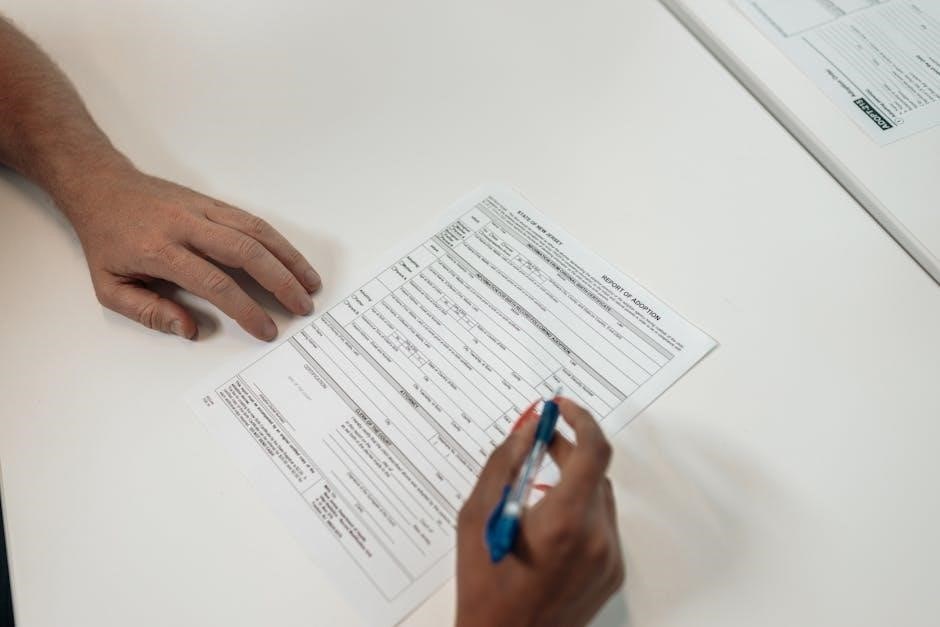The Free Tenant Application Form BC is a essential tool for renters in British Columbia, designed to streamline the rental process and ensure compliance with local tenancy laws. It collects personal, rental, and financial information, helping landlords assess applicants while protecting tenant rights. This form is widely available online and is a crucial first step for anyone applying to rent property in BC.
1.1 Overview of the BC Tenant Application Form
The BC Tenant Application Form is a standardized document used by landlords to assess potential tenants. It collects essential information such as personal details, rental history, employment, and financial status. The form is designed to streamline the rental application process while ensuring compliance with British Columbia’s tenancy laws. It is freely available online and serves as a fair and efficient tool for both tenants and landlords to initiate the rental relationship.
1.2 Importance of Using a Tenant Application Form in BC
Using a tenant application form in BC is crucial for ensuring a fair and transparent rental process. It helps landlords assess applicants consistently, reducing discrimination risks. The form also protects tenants by outlining the information landlords can legally request. By standardizing the application process, it ensures compliance with British Columbia’s tenancy laws, promoting a balanced and structured approach for both parties. This fosters trust and clarity in the landlord-tenant relationship.

Key Sections of the Free Tenant Application Form BC
The form includes personal and contact information, rental history, employment details, financial data, and references. These sections help landlords evaluate applicants fairly and efficiently.
2.1 Personal and Contact Information
This section requires applicants to provide their full name, current address, phone number, and email. It also asks for emergency contact details and previous addresses. Accurate and complete information helps landlords verify identities and maintain communication throughout the rental process. Ensuring all fields are filled correctly is crucial for a smooth application evaluation and to avoid delays in processing.
2.2 Rental History and References
This section requires details about the applicant’s rental history, including previous landlords’ names, addresses, and contact information. Applicants must also provide references, typically from landlords or property managers, to verify their tenancy behavior. Personal references may be included to highlight the applicant’s reliability. Accurate and complete rental history helps landlords assess potential tenants’ suitability and responsibility in maintaining a tenancy agreement. This information is critical for evaluating an application fairly and efficiently.
2.3 Employment and Financial Information
This section collects details about the applicant’s employment history, including current and past employers, job titles, and income sources. Financial information such as bank account details, credit history, and monthly income is also required to assess the applicant’s ability to pay rent. This data helps landlords evaluate financial stability and ensure the tenant can meet rental obligations. Providing accurate and detailed information is crucial for a smooth tenancy process.
2.4 Additional Requirements and Disclosures
This section includes extra details such as pet ownership, smoking habits, or additional occupants. It may also require disclosures about prior evictions or legal issues. Applicants must consent to background and credit checks, authorizing landlords to verify employment and rental history. The form may outline specific terms or restrictions, ensuring transparency and compliance with tenancy laws. Accurate disclosure helps build trust and avoids future disputes between tenants and landlords.

Where to Find the Free Tenant Application Form BC
The Free Tenant Application Form BC is accessible through official government websites, trusted online platforms like DocHub, and legal aid resources in British Columbia.
3.1 Official Government Sources
The Free Tenant Application Form BC can be downloaded from official government websites, such as the British Columbia government’s housing and tenancy resources page. These sources provide standardized, legally compliant forms designed to protect both tenants and landlords. They often include instructions and additional resources to guide users through the application process. Visit the BC government website or contact local housing authorities for direct access to the form and related information.
3.2 Trusted Online Platforms for Download
Trusted online platforms like DocHub and Lumin offer free downloads of the BC Tenant Application Form. These platforms provide customizable templates that minimize errors and ensure compliance with BC tenancy laws; Users can easily edit, fill, and sign the forms digitally, streamlining the application process. Additionally, these platforms often include guides and resources to help tenants and landlords navigate the rental application process efficiently and effectively. They are reliable sources for accurate and up-to-date forms.
3.3 Legal Aid and Tenancy Resources
Tenants in BC can access legal aid and tenancy resources through organizations like the Residential Tenancy Branch (RTB) and Legal Aid BC. These resources provide free or low-cost assistance with understanding tenant rights, completing application forms, and resolving disputes. Official government websites and trusted legal aid services offer downloadable guides and forms, ensuring tenants have the support they need to navigate the rental process confidently and legally.
How to Fill Out the Tenant Application Form BC
Complete the form by providing accurate personal, rental, and financial details. Ensure all sections, including employment history and references, are filled out thoroughly to avoid delays.
4.1 Step-by-Step Guide to Completing the Form
- Download the Free Tenant Application Form BC from trusted sources like official government websites or legal aid platforms.
- Fill in personal and contact information accurately, ensuring all details are up-to-date.
- Provide a detailed rental history, including previous landlords and references.
- Complete the employment and financial sections, attaching proof of income if required.
- Review the form for completeness and sign it before submission.
- Submit the application and keep a copy for your records.
4.2 Common Mistakes to Avoid
- Not thoroughly reading the form’s instructions before starting.
- Leaving sections incomplete or providing vague information.
- Submitting inaccurate or misleading details about employment or rental history.
- Forgetting to attach required documents, such as proof of income or references.
- Rushing through the application, leading to errors or omissions.
- Not keeping a copy of the completed form for personal records.

Legal Considerations for Tenants in BC
Tenants in BC must understand their rights under the Residential Tenancy Act, ensuring the application process complies with legal standards. Landlords cannot request unnecessary personal information, and tenants should seek legal advice if disputes arise.
5.1 Understanding Tenancy Laws and Rights
Understanding BC’s tenancy laws is crucial for tenants to protect their rights. The Residential Tenancy Act governs rental agreements, outlining rules for security deposits, lease terms, and eviction processes. Tenants must know their rights, such as the right to a safe living environment and protection against illegal evictions. Familiarizing oneself with these laws ensures a fair rental experience and provides a foundation for resolving disputes effectively.
5.2 What Landlords Can and Cannot Ask For
Landlords in BC can request rental history, employment details, and credit checks to assess applicants. However, they cannot ask for personal information like marital status, ethnicity, or medical history. The law prohibits discriminatory practices, ensuring tenants are judged fairly. Understanding these boundaries helps tenants know their rights and ensures landlords comply with legal standards when screening applications. This balance protects both parties and promotes a fair rental process.

Tips for Tenants When Using the Free Application Form
Tenants should ensure all sections are completed accurately and honestly. Organize required documents beforehand to avoid delays. Highlighting stability and positive references can strengthen your application.
6.1 How to Stand Out as a Tenant Applicant
To stand out, provide detailed rental history with positive references and proof of employment stability. Highlighting a clean credit record and reliable income sources strengthens your application. Including a cover letter explaining your situation can also make a positive impression. Ensure all documents are neatly organized and submitted promptly. Using online tools like DocHub or Lumin to personalize and error-check your application can further enhance its professionalism and appeal to landlords.
6.2 What Landlords Look for in an Application
Landlords prioritize applicants with a stable employment history, reliable income, and positive rental references. They also assess creditworthiness and verify financial stability. A complete and honest application, including all required documentation, is crucial. Landlords may also look for consistency in the information provided and any additional details that demonstrate responsibility, such as proof of employment or extra references. A well-presented application can significantly improve your chances of approval.
Dispute Resolution and Tenancy Agreements
The Residential Tenancy Branch (RTB) plays a key role in resolving disputes between tenants and landlords in BC. Disputes related to tenancy agreements, unpaid rent, or application issues can be addressed through formal processes, ensuring fair outcomes for all parties involved.
7.1 Role of the Residential Tenancy Branch (RTB)
The Residential Tenancy Branch (RTB) in British Columbia is a government body that oversees landlord-tenant disputes and enforces tenancy laws; It provides resources for resolving issues, such as unpaid rent or application disputes, through mediation and arbitration. Tenants can submit applications for dispute resolution, ensuring their rights are protected under BC legislation. The RTB also offers guidance on tenancy agreements and rental applications, fostering a fair rental environment.
7.2 How to Handle Disputes Related to Applications
If a dispute arises regarding a tenant application, applicants can seek resolution through the Residential Tenancy Branch (RTB). Tenants may submit a dispute resolution request using the appropriate RTB forms, such as those for unpaid rent or application-related issues. The RTB provides mediation and arbitration services to address concerns fairly. Understanding your rights and ensuring all application details are accurate can help prevent or resolve disputes effectively, maintaining a smooth tenancy process in British Columbia.
Additional Resources for Tenants in BC
Tenants in BC can access resources like the Residential Tenancy Branch (RTB) for guides, forms, and dispute resolution. Official government websites, legal aid services, and online platforms provide free tools and assistance, ensuring tenants are well-informed and supported throughout the rental process.
8.1 Guide to Renting in British Columbia
A comprehensive guide to renting in BC outlines tenant rights, responsibilities, and the rental process. It covers topics like understanding the free tenant application form, rental agreements, and dispute resolution. Tenants can find detailed information on legal protections, deposit rules, and eviction procedures. The guide also directs renters to resources like the Residential Tenancy Branch and legal aid services, ensuring they are well-prepared and informed when applying for a rental property in British Columbia.
8.2 Free Legal Assistance for Tenants
Free legal assistance is available to tenants in BC through organizations like Legal Aid BC and community legal clinics. These services provide guidance on tenancy laws, disputes, and tenant rights. Tenants can access resources to understand their obligations and protections under the Residential Tenancy Act. Additional support includes hotline services and online materials to help tenants navigate issues like evictions, repairs, and rental agreements, ensuring they are informed and protected throughout the tenancy process.
The Free Tenant Application Form BC is an essential tool for renters, streamlining the rental process while protecting tenant and landlord rights. It ensures compliance with tenancy laws, providing clarity and fairness for all parties involved. By using this form, tenants can confidently apply for rentals, knowing their rights are safeguarded under British Columbia’s legal framework.
9.1 Final Thoughts on Using the Free Tenant Application Form BC
Using the Free Tenant Application Form BC ensures a fair and efficient rental process for both tenants and landlords. It provides a clear framework for submitting necessary information and protects both parties by adhering to BC’s tenancy laws. Tenants can confidently apply for rentals knowing their rights are safeguarded, while landlords can efficiently evaluate applicants. This form is a valuable resource for anyone renting in British Columbia, promoting transparency and legal compliance.
9.2 Next Steps After Submitting the Application
After submitting the Free Tenant Application Form BC, the landlord will review your application, potentially conduct reference checks, and assess your suitability. If approved, you’ll receive a tenancy agreement to sign, outlining terms like rent, duration, and responsibilities. Once signed, prepare for move-in by arranging utilities and ensuring the property is inspected. Keep communication open with the landlord and clarify any concerns before finalizing the agreement.